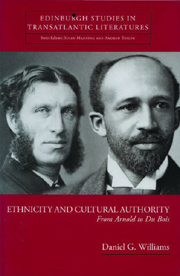Conclusion
Published online by Cambridge University Press: 12 September 2012
Summary
The idea of culture formulated by Matthew Arnold emerged from a nineteenth century tradition of thought that began to separate the aesthetic and intellectual activities of men from the material and economic developments of an industrialising society. As the nineteenth century progressed, culture, in Raymond Williams's words, became ‘a court of human appeal, to be set over the processes of practical social judgement … as a mitigating and rallying alternative’. It is this idea of culture as being a source of oppositional and supplementary ideas to the perceived dominant values of an industrial society that led to the particular form that the convergence of culture and ethnicity took in the years between 1865 and 1910. Thus, the value of ‘the greater delicacy and spirituality of the Celtic peoples’ for Arnold was that it proved to be a counterbalance to the hard-headed materialism of English philistine society. Similarly, William Dean Howells detected in the ‘childish simple-heartedness’ of African Americans a source of regeneration for an ‘over-civilized’ United States. These conceptions of Celtic and African-American uniqueness became influential within those groups themselves. W. B. Yeats followed Arnold in considering the Irish a ‘conquered race’ with a particular insight into ‘charms, dreams and visions’, and W. E. B. Du Bois believed that African Americans were ‘the sole oasis of simple faith and reverence in a dusty desert of dollars’.
- Type
- Chapter
- Information
- Ethnicity and Cultural AuthorityFrom Arnold to Du Bois, pp. 224 - 228Publisher: Edinburgh University PressPrint publication year: 2005



